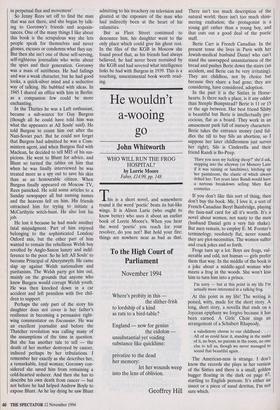He wouldn't a-wooing go
John Whitworth
WHO WILL RUN THE FROG HOSPITAL? by Lorrie Moore Faber, f14.99, pp. 148 his is a short novel, and somewhere round it the word 'poetic' beats its bat-like wings. It is Alison Lurie (who ought to know better) who uses it about an earlier book of Lorrie Moore's. When you hear the word 'poetic' you reach for your revolver, do you not? But hold your fire: things are nowhere near as bad as that. There isn't too much description of the natural world; there isn't too much shim- mering exultation; the protagonist is a young girl rather than a young boy, and that cuts out a good deal of the poetic stuff.
Berie Carr is French Canadian. In the present tense she lives in Paris with her Jewish-medical husband Daniel who can't stand the unwrapped unsanitariness of the bread and pushes Berie down the stairs (an accident, and Berie can be very irritating). They are childless, not by choice but because they share a bad gene; they are considering, have considered, adoption.
In the past it is the Sixties in Horse- hearts. Is there such a place, is it any odder than Steeple Bumpstead? Berie is 11 or 15 or the age between. Her best friend Silsby is beautiful but Berie is intellectually pre- cocious, flat as a board. They work in an amusement park full of nursery characters. Berie takes the entrance money (and fid- dles the till to buy Sils an abortion, so I suppose her later childlessness just serves her right), Sils is Cinderella and their friend Randi is Bo-Peep.
`Have you seen my fucking sheep?' she'd ask, stepping into the alleyway (or Memory Lane if it was raining or lunchtime), hitching up her pantaloons, the elastic of which always itched her. Ten years later Randi would have a nervous breakdown selling Mary Kay cosmetics .. „
If you don't like this sort of thing, then don't buy the book. Me, I love it, a sort of French-Canadian Beryl Bainbridge, playing the faux-naif card for all it's worth. It's a novel about women, not nasty to the men (husband Daniel gets a very fair shake). But men remain, to employ E. M. Forster's terminology, resolutely flat, never round; they are plot-necessities. The women suffer and crack jokes and so forth.
Frogs turn up a lot. Boys are frogs, vul- nerable and odd, not human — girls prefer them that way. In the middle of the book is a joke about a middle-aged woman who meets a frog in the woods. She won't kiss him to turn him into a prince.
I'm sorry — but at this point in my life I'm actually more interested in a talking frog.
At this point in my life! The writing is poised, witty, made for the short story. A long, short story, a novella that ends on a Joycean epiphany we forgive because it has been earned. A Girls' Choir sings an arrangement of a Schubert Rhapsody,
a valedictory chorus to our childhood . . . All of us could hear it, standing in the midst of it, no boys, no parents in the room, no one else to tell us, though we never managed to sound that beautiful again.
The American-ness is strange. I don't know the records she plays in her version of the Sixties and there is a small, golden bugger floating in the dark on page 67, startling to English persons. It's either an insect or a piece of nasal detritus, I'm not sure which.


































































 Previous page
Previous page